Shortly after his sentencing last week for his role in a canned tuna price-fixing scandal, former Bumble Bee CEO Chris Lischewski released a document in which he argues he was found guilty of a crime he did not commit and a crime where there is no victim.
Lischewski argues in the document that the government failed to show any consumer impact from price fixing.
A copy of the full letter can be downloaded here (pdf).
Under a long-standing legal analysis used in antitrust cases called the Per Se rule, which the Department of Justice (DOJ) used to prosecute Lischewski, the agreement to fix prices is the crime and there is no requirement to show proof of any price-fixing effect.
As a result, the government was not required to prove any financial impact or financial harm from the purported tuna price fixing agreement, a fact Lischewski argued against as part of his defense.
"The legal power entrusted to the [DOJ] is capable of crushing almost any defense and is the primary reason that more than 90 percent of price fixing cases are settled out of court with guilty pleas – even when there may not have been any wrongdoing. I chose to fight, and I will continue to fight, because I am innocent," wrote Lischewski.
The document goes into extensive detail about why Lischewski believes he was wrongly convicted, an analysis of canned tuna pricing, and his relationship with co-conspirators named in the case.
Lischewski noted the DOJ has opened price-fixing investigations in the largest beef and poultry producers in the United States. And last fall, the DOJ began investing Mowi and other farmed salmon suppliers for similar price-fixing behavior.
He ends the nearly 4,000-word document with this warning: "If the low bar of the Per Se rule is allowed to be applied to all of these companies, we may ultimately see our entire protein supply shift to foreign suppliers."
The "Big Three" US canned tuna brands, which supply the overwhelming volume consumed in the United States, are all owned by non-American companies. Thailand-based Thai Union Group owns Chicken of the Sea, Korea-based Dongwon owns Starkist, and FCF Fishery, a Taiwanese tuna harvester and processor, acquired a bankrupt Bumble Bee from Lion Capital and other investors in January for $930 million (€841 million) in January.




